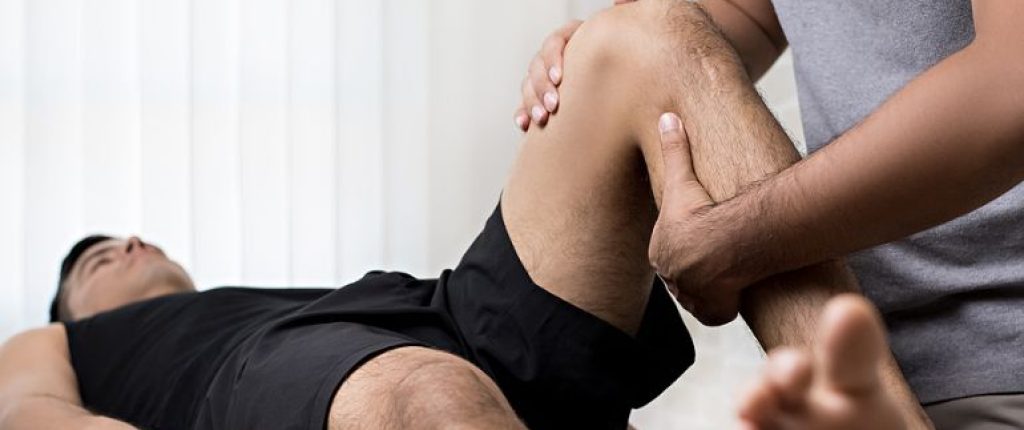Dealing with knee pain can be a debilitating and frustrating experience. Whether you’re suffering from a recent knee injury, chronic knee pain, or post-surgical discomfort, it’s essential to understand the options available for effective treatment. One of the primary treatment avenues to consider is physical therapy. But how do you know if physical therapy is right for your knee pain?
This comprehensive guide delves into the various aspects of physical therapy in treating knee pain, providing you with the insights you need to make an informed decision.
Knee Pain Origins & Types
Knee pain can have numerous causes, making it crucial to identify the root of your discomfort. Each type of knee pain may necessitate a different approach to treatment. Regardless of the cause, physical therapy offers therapeutic interventions aimed at alleviating pain and improving function.
- Meniscus Tears
- Ligament Injuries (e.g., ACL, MCL)
- Arthritis
- Patellar Tendinitis
- Bursitis
Role Of The Physical Therapist
A physical therapist is a licensed healthcare professional specializing in diagnosing and treating musculoskeletal disorders. They are skilled in devising pain treatment techniques and exercises that specifically target knee pain.
- Assess your knee condition through physical examinations and self-reported knee pain metrics.
- Develop a customized treatment plan tailored to your specific needs.
- Guide you through rehabilitation exercises to recover knee function.
- Offer pain management techniques to reduce discomfort.
This personalized approach ensures that each patient receives the best possible care, intending to restore mobility and alleviate pain.
Why Choose Physical Therapy For Knee Replacement Recovery?
Physical therapy is vital for a successful recovery if you’ve undergone knee replacement surgery.
- Accelerates the healing process.
- Reduces the risk of post-surgical complications.
- Improves movement patterns and flexibility.
- Enhances muscle strength supporting the knee joint.
- Facilitates a quicker return to daily activities.
Physical therapists are crucial in helping knee-replacement patients regain lost mobility and strength, making them an indispensable part of the recovery journey.
Benefits Of Non-Surgical Treatment Methods
Johns Hopkins suggests physical therapy as an effective non-surgical treatment for knee pain.
- Avoids the risks associated with surgery.
- Offers a cost-effective pain relief plan.
- Provides a holistic approach to treating knee pain.
- Can be combined with other pain management techniques for optimal results.
Non-surgical interventions focus on healing and strengthening the knee without the invasiveness of surgical procedures, making them a desirable option for many patients.
Customized Treatment Plans
One of the primary advantages of physical therapy is the creation of a customized treatment plan. These tailored plans ensure that you receive the most effective treatment for your specific type of knee pain.
- Personalized exercises tailored to your knee condition.
- Adaptable therapies based on your progress.
- Inclusion of various therapeutic interventions like ultrasound, heat therapy, and electrical stimulation.
Rehabilitation Exercises & Conditioning Programs
Rehabilitative exercises are at the heart of physical therapy. They help in improving knee function and reducing pain. A conditioning program may also be recommended to enhance overall leg strength and stability, further ensuring long-term knee health.
- Quadriceps Sets
- Hamstring Stretches
- Heel Slides
- Leg Raises
- Step-Ups
Dealing With Chronic Knee Pain
Chronic knee pain typically requires a comprehensive pain treatment strategy. Physical therapy can help manage chronic pain by:
- Identifying & Correcting Improper Movement Patterns
- Reducing Inflammation With Targeted Therapies
- Strengthening The Muscles Around The Knee
- Improving Range Of Motion & Flexibility
Addressing these issues can significantly alleviate chronic knee pain and improve overall knee function.
Orthopedic Physical Therapy
Orthopedic physical therapy focuses on the musculoskeletal system, specifically addressing bones, muscles, joints, tendons, and ligaments. An orthopedic physical therapist will employ a mix of treatments, including manual therapy, strengthening exercises, and modalities like ultrasound, to achieve optimum results.
- Knee Injury Recovery
- Managing Pain Syndromes
- Rehabilitation Post-Knee Surgery
Ensuring Successful Knee Injury Recovery
Recovering from a knee injury can be a long and challenging process. Early intervention with physical therapy can make a significant difference in the speed and success of recovery.
- Reducing Swelling & Pain
- Restoring Full Range Of Motion
- Building Strength In The Affected Area
- Preventing Future Injuries
- Creating Strategies For Better Knee Joint Health
Pain Management Techniques In Physical Therapy
Several pain management techniques are employed in physical therapy to alleviate knee pain, such as:
- Manual Therapy
- Heat & Cold Therapy
- Ultrasound Therapy
- Electrical Stimulation
- Aquatic Therapy
These techniques aim to provide immediate pain relief while contributing to long-term knee health.
When a Doctor Recommends Physical Therapy
Often, a doctor will recommend physical therapy for knee pain when:
- The patient is experiencing knee pain that hasn’t responded to initial treatments.
- There’s evidence of joint instability.
- Rehab post-surgery is needed.
Indicators Physical Therapy Is Necessary
Certain signs indicate that physical therapy may be necessary for your knee pain.
- Persistent Pain That Affects Daily Activities
- Increased Pain Or Swelling With Movement
- Limited Range Of Motion
- Difficulty Performing Exercises
PT Effectiveness & Success Rates
Research and self-reported knee pain studies show that physical therapy is highly effective for many knee conditions. Adhering to your therapist’s plan is key to achieving successful outcomes. Success is determined by several factors.
- Severity Of The Knee Condition
- Patient Compliance With Treatment Plans
- Regular Attendance Of Therapy Sessions
Take The Next Step To Relieving Your Knee Pain
If you’re struggling with knee pain and considering physical therapy, Centennial Sports & Physical Therapy in Spokane, WA, can provide the expert care you need. Our experienced therapists are dedicated to developing customized treatment plans focused on pain relief and improved mobility. Contact us today to start your journey toward a pain-free life.


